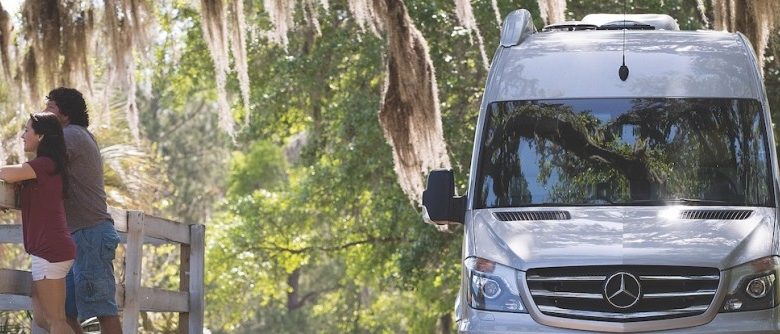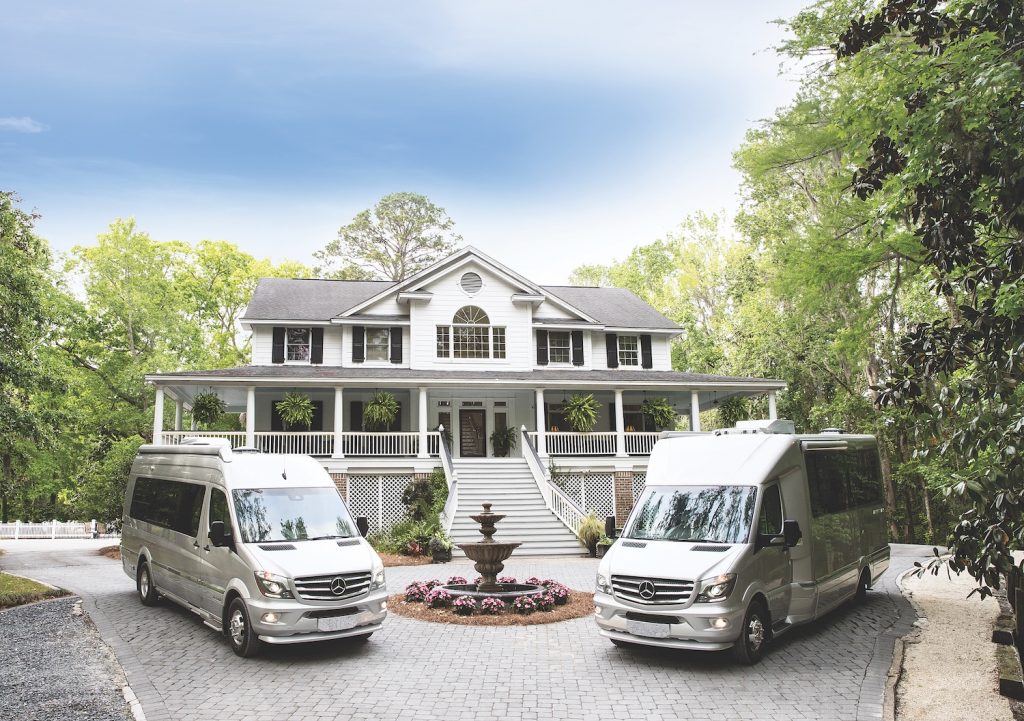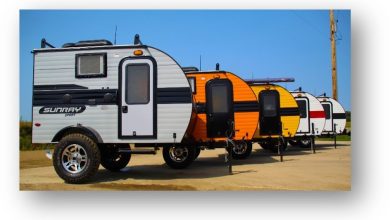Airstream’s Class B Classics

Becoming an iconic brand, regrettably, can sometimes become a barrier to innovation for some companies. That has not been a problem for Airstream, however.
Over the decades, the RV manufacturer has kept innovation at the forefront, experimenting with travel trailers and compact motorhomes.
Among the most notable (and enduring) successes has been Airstream’s early and sustained foray into the now rapidly growing niche market of Class B touring coaches. In recent years, the RV maker has become an industry leader in the Class B space utilizing the proven Mercedes-Benz Sprinter platform.
Airstream was among the first RV manufacturers to leverage the Sprinter, launching its Class B models the very first year the vans were imported from Europe, according to Tim Garner, Airstream’s general manager, motorized division.

The Atlas is Airstream’s newest, most luxurious touring coach to date.
Unlike other early adopter B-van outfitters – which sell product lines aimed at a wide variety of price points – Airstream has essentially staked out the highest-end position in the Class B marketplace from Day 1, according to Garner. That dedication to luxury fit and finish and a focus on owner safety has created notable growth for Airstream.
“We were among the first in the Class B segment, but we really re-committed to Class B in the past seven or eight years and the market has really come roaring back in that time,” he says. “We know our sweet spot is the luxury high end of that market, and we see a tremendous amount of growth there in years to come.”
Garner says that while Airstream was retailing about 70 Class B units annually 10 years ago, he projects moving about 700 such motorhomes this year.
That’s not a bad experiment by any measure – even if the Class B segment is still a very small niche within the overall RV market. (The RV Industry Association projects that manufacturers will ship about 5,600 Class B units to dealers in 2018. By comparison, RV makers are expected to ship 24,600 Class A motorhomes and 35,300 Class C motorhomes in 2018.)
Still, with significant growth and a well-earned position at the top end of the market, Airstream sees great opportunity in the space.
“When we hit that 700-unit mark, we’ll have about 30 percent market share in the class,” says Garner. “And on the Mercedes-Benz diesel side, we’ve been the market leader since 2012.”
Quality Over Quantity
Garner and others at Airstream note that if greater market share were the sole goal, Airstream likely would have pursued additional Class B platforms – including the increasingly popular gas-powered models built on Dodge and Ford chassis. While the allure of greater volume in these new Class B models is significant, Airstream’s commitment to the Mercedes-Benz Sprinter platform is critical to its success, according to Lenny Razo, Airstream’s vice president of sales.
“You see huge numbers on the Dodge chassis, for example, and we’ve noted that,” he says. “In the past, we’ve tried using other chassis, but today we know our customers well. We get constant input from both our consumers and non-consumers of various age and demographic ranges. We know what they read, what cars they own, what places they shop and travel.
“We do our research and we know they want the best-in-class – never less. That’s really what Airstream is all about,” he adds. “Because of that, on the Mercedes-Benz chassis, we take every option the manufacturer offers. It does make them among the most expensive ones out there, but our customers are willing to pay that premium.”
Garner concurs, noting that Airstream spared no expense in understanding the customer experience related to its products, including its growing focus on Class B units.
“When it comes to the customer experience, we do interviews and videoconferences with our customers to understand how they think and live and then incorporate that knowledge from the very early stages of product development,” he says. “From that research, we know we have two significantly different customer groups for our Class B units.
“One group is an RVer, but the other group is really a non-RVer that doesn’t use it like an RV. One of our most popular units for this group is The Lounge, which seats nine people. These are luxury affluent buyers, many of whom have second and third homes and use the Class B to travel and tour from one home to the next. For those buyers, on-board amenities like the bathroom are extra to them. This buyer puts a lot of value into both our brand and into Mercedes-Benz’ brand. They’re buying the quality, but they’re also buying the image.
“We know these customers are living life at the highest level,” Garner adds. “Many are entrepreneurs or business leaders and this is part of their bucket list. It’s part of their lifestyle. We know that 50 percent of them also have boats and motorcycles. Most have luxury cars. We really use those preferences to understand them and provide the best possible product.”
And along with the best possible products, Airstream’s discerning customers also expect the best possible service, according to Razo.
“That level of service extends completely through the process of shopping, purchasing and throughout the ownership experience,” he says. “We have dealer standard programs, for example, that we use to ensure that every dealer meets these very high standards. From the sales teams to the service bays, every touring coach customer completes a survey that rates our dealers on nearly every possible aspect of the process. We do that because we want to ensure when a customer comes in and buys one of our units they can get the absolute highest level of experience anywhere. Once a customer begins the process of purchasing an Airstream, everything should be best-in-class.”
Best-in-Class Products, Brand Partnerships
Airstream has reached its current motorized sales level of more than 750 retails annually by relying on the strength and popularity of its 24-foot Interstate EXT Class B Touring Coach. Sales for this model have established Airstream as the No. 1-selling Mercedes-Benz Class B for six years in a row.
Meanwhile, Airstream launched its popular Atlas Class B+ Touring Coach the end of 2017. Both the Atlas and the Interstate EXT are built on the Mercedes-Benz 3500 platform.
Separately, a recent brand collaboration with Seattle-based sportswear and lifestyle brand Tommy Bahama provided an additional boost. With island-inspired interiors and accessories, the collaboration was an instant winner.
The new package, built on the Atlas Class B+, has received “a tremendous response from our global dealer network, and we’re already working to get those orders filled,” Razo says. Garner agrees, noting that the two brands share important lifestyle traits, making them a natural pair in the minds of high-end consumers.
“On the motorized side of our business, the Tommy Bahama collaboration has been a home run,” he says. “We know our buyer side loves that. They have boats and beach homes and they appreciate that laid back but very premium lifestyle that Tommy Bahama represents. Then, you throw the Mercedes-Benz brand into the mix, and you’ve got a combination of brands that people absolutely love. That model is contributing a large percentage of sales right now.”
Just don’t call it a special edition.
“I wouldn’t even call it a special edition,” Garner says. “This relationship with Tommy Bahama is more of a strategic partnership. They had a hand in designing every facet of it. It was a true co-design process, down to the last detail. On the trailer side, Airstream has done special editions for years, but those were typically a short-term arrangement, maybe building 100 units. We hope this will be a collaboration that lasts for many, many years.”
Looking to the future, Garner says other such brand collaborations are always on the table. They just have to be the right fit, which isn’t an easy thing to achieve.
In the meantime, Airstream just announced a new model based on the premise that smaller can be better: The recently released Interstate Nineteen, manufactured on a shorter 19-foot Mercedes-Benz 2500 chassis. That motorhome builds on the brand’s history of first-class luxury, car-like performance and safety.
“It has all the luxuries of the popular 24-foot Interstate EXT, but because it’s almost 5 feet shorter, it offers more driving maneuverability, comfort behind the wheel and gives occupants more of an SUV-type feeling,” Razo says.
And that’s while bringing to market what the RV maker asserts are “50 best-in-class features” that enable customers to bring all the comforts and technologies found at home with them as they hit the road. And it doesn’t hurt that it can fit in a standard parking space, which is certain to please both skilled and novice owners.
Keeping in line with the brand’s approach to excellence, however, don’t expect the shorter models to be inexpensive.
“With that model in particular and if you’re looking at B van category in general, you might suspect that small is cheaper, but in most cases you’d be wrong,” says Garner. “We are looking to take our same premium position with that smaller van category and offer the same premium features and upfit that our customers love. We see a lot of upside in that space.”



